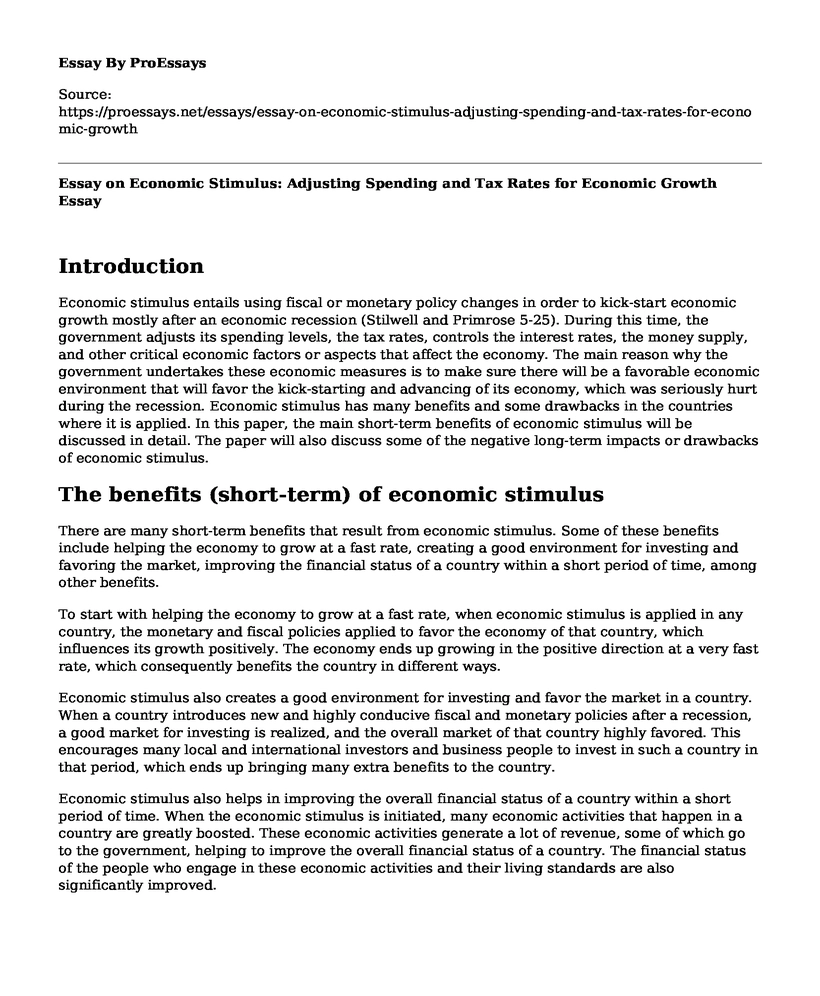Introduction
Economic stimulus entails using fiscal or monetary policy changes in order to kick-start economic growth mostly after an economic recession (Stilwell and Primrose 5-25). During this time, the government adjusts its spending levels, the tax rates, controls the interest rates, the money supply, and other critical economic factors or aspects that affect the economy. The main reason why the government undertakes these economic measures is to make sure there will be a favorable economic environment that will favor the kick-starting and advancing of its economy, which was seriously hurt during the recession. Economic stimulus has many benefits and some drawbacks in the countries where it is applied. In this paper, the main short-term benefits of economic stimulus will be discussed in detail. The paper will also discuss some of the negative long-term impacts or drawbacks of economic stimulus.
The benefits (short-term) of economic stimulus
There are many short-term benefits that result from economic stimulus. Some of these benefits include helping the economy to grow at a fast rate, creating a good environment for investing and favoring the market, improving the financial status of a country within a short period of time, among other benefits.
To start with helping the economy to grow at a fast rate, when economic stimulus is applied in any country, the monetary and fiscal policies applied to favor the economy of that country, which influences its growth positively. The economy ends up growing in the positive direction at a very fast rate, which consequently benefits the country in different ways.
Economic stimulus also creates a good environment for investing and favor the market in a country. When a country introduces new and highly conducive fiscal and monetary policies after a recession, a good market for investing is realized, and the overall market of that country highly favored. This encourages many local and international investors and business people to invest in such a country in that period, which ends up bringing many extra benefits to the country.
Economic stimulus also helps in improving the overall financial status of a country within a short period of time. When the economic stimulus is initiated, many economic activities that happen in a country are greatly boosted. These economic activities generate a lot of revenue, some of which go to the government, helping to improve the overall financial status of a country. The financial status of the people who engage in these economic activities and their living standards are also significantly improved.
The negatives (long term) of economic stimulus
Despite having many benefits, economic stimulus also has some drawbacks or negative effects. Some of the long-term negative effects of economic impacts include disadvantaging some normal poor civilians who cannot get good money to invest, may make a country struggle paying huge debts that it borrowed when trying to adjust the fiscal and monetary policies after the recession period, among other long-term negative effects.
Regarding disadvantaging the normal poor civilians who cannot get good money to invest, economic stimulus disadvantage these poor citizens in the sense that they end up being exploited by the other wealthy people who enjoy the good investing environment created by economic stimulus. These wealthy investors and business people take advantage of the many poor people that were greatly hurt by the recession and pay them peanut wages while giving them too much work. In the long run, these poor citizens remain to be poor despite their countries enjoying rapid economic growth.
If not well planned for, an economic stimulus may also make some countries end up with huge debts that they will struggle to pay for a long time. In the initiation of this economic stimulus, some governments may borrow a lot of money that will help them to set a favorable economic environment in their countries. If the economy does not work as planned and fail to yield the expected benefits, such countries may be left in great trouble struggling to settle their debts (Corden 38-47).
Works Cited
Corden, W. Max. "The theory of the fiscal stimulus: how will a debt-financed stimulus affect the future?" Oxford Review of Economic Policy 26.1 (2010): 38-47.
Stilwell, Frank, and David Primrose. "Economic stimulus and restructuring: Infrastructure, green jobs and spatial impacts." Urban policy and research 28.1 (2010): 5-25.
Cite this page
Essay on Economic Stimulus: Adjusting Spending and Tax Rates for Economic Growth. (2023, Apr 24). Retrieved from https://proessays.net/essays/essay-on-economic-stimulus-adjusting-spending-and-tax-rates-for-economic-growth
If you are the original author of this essay and no longer wish to have it published on the ProEssays website, please click below to request its removal:
- Ethics in Finance
- Different Sources of Income That Are Taxable Paper Example
- Mauritius Economics - Essay Sample
- Ways in Which Globalization Has Led to Marginalization in the Developing World - Essay Sample
- Essay Example on Unlock the Secrets of Value Investing: The Money Machine
- Essay Example on Nike Inc.'s Influential Organizational Culture: Shaping Employees' Behaviour
- Computers and Globalization - Report Example







